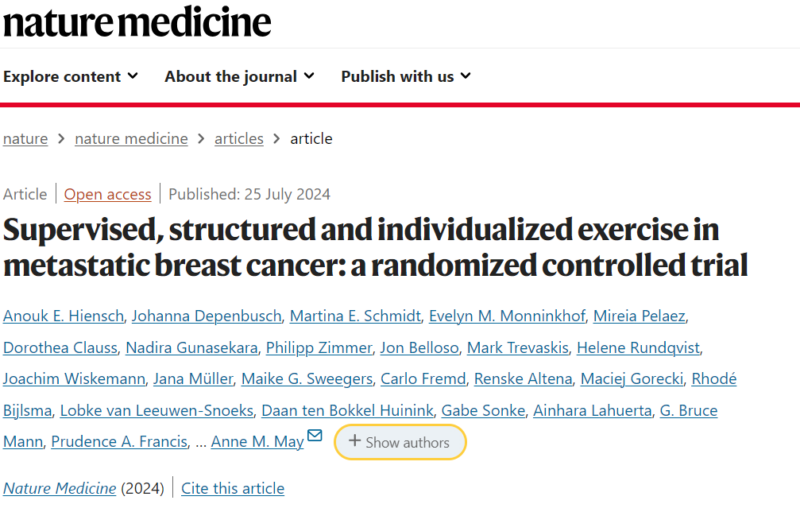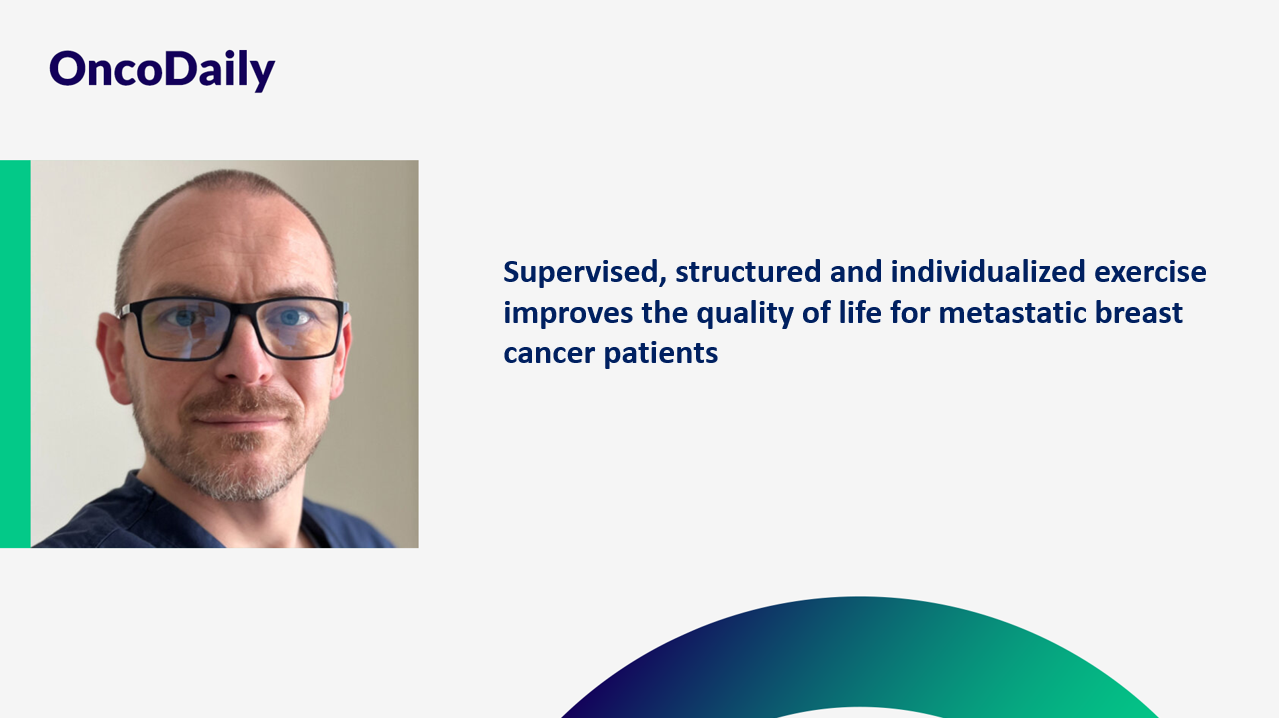Piotr Wysocki recently shared on LinkedIn:
“A recent study published in Nature Medicine, led by Anouk E. Hiensch, demonstrates that supervised, structured, and individualized exercise significantly improves health-related quality of life (HRQOL) and reduces physical fatigue in patients with metastatic breast cancer (MBC).
Study Overview
The multinational PREFERABLE-EFFECT trial, conducted across eight study centers in five European countries and Australia, involved 357 patients with MBC. These patients had a life expectancy of at least six months and no unstable bone metastases. They were randomly assigned to either a control group receiving usual care (179 participants) or an exercise group participating in a 9-month supervised exercise program (178 participants).
Key Findings
Primary Outcomes:
- HRQOL: The exercise group showed significantly better HRQOL at 6 months compared to the control group (between-group difference (BGD), 4.8; Bonferroni–Holm-adjusted P = 0.0003; effect size (ES), 0.33).
- Physical Fatigue: The exercise group also reported lower levels of physical fatigue at 6 months (BGD, -5.3; Bonferroni–Holm-adjusted P = 0.027; ES, 0.22).
Secondary Outcomes:
- HRQOL Improvements: Improvements were observed at 3 months (BGD, 3.9; ES, 0.27) and 9 months (BGD, 4.3; ES, 0.30).
- Physical Fatigue Reduction: Sustained reductions in physical fatigue were noted at 9 months (BGD, -5.6; ES, 0.24).
- Physical Fitness: Enhanced physical fitness was evident at 6 months (BGD, 24.8 W; ES, 0.47).
- Various HRQOL Measures: Significant improvements were seen in global quality of life, physical functioning, role functioning, social functioning, pain, and dyspnea at multiple time points.
Safety and Adherence:
- Adherence: The median attendance rate for supervised exercise sessions was 77%, with compliance rates ranging from 59% to 100% for different exercise components.
- Adverse Events: Two exercise-related serious adverse events were reported, both of which were managed, allowing participants to continue the exercise program. Common adverse events included pain, dizziness, muscle soreness, and fatigue, leading to adjustments in the exercise regimen.
Exploratory Outcomes:
- Effect Modification: The positive effects on HRQOL and physical fatigue did not significantly vary with clinical characteristics or baseline physical fitness. Greater HRQOL improvements were noted in younger participants and those with higher baseline pain levels.
Conclusion
The PREFERABLE-EFFECT trial proves that supervised, structured, and individualized exercise programs can significantly benefit patients with MBC by improving HRQOL and reducing physical fatigue. These findings support the inclusion of such exercise interventions as part of supportive care for patients with metastatic breast cancer.”
Authors: Anouk E. Hiensch, Johanna Depenbusch, Martina E. Schmidt, Evelyn M. Monninkhof, Mireia Pelaez, Dorothea Clauss, Nadira Gunasekara, Philipp Zimmer, Jon Belloso, Mark Trevaskis, Helene Rundqvist, Joachim Wiskemann, Jana Müller, Maike G. Sweegers, Carlo Fremd, Renske Altena, Maciej Gorecki, Rhodé Bijlsma, Lobke van Leeuwen-Snoeks, Daan ten Bokkel Huinink, Gabe Sonke, Ainhara Lahuerta, G. Bruce Mann, Prudence A. Francis, Gary Richardson, Wolfram Malter, Elsken van der Wall, Neil K. Aaronson, Elzbieta Senkus, Ander Urruticoechea, Eva M. Zopf, Wilhelm Bloch, Martijn M. Stuiver, Yvonne Wengstrom, Karen Steindorf and Anne M. May.

Source: Piotr Wysocki/LinkedIn
About Piotr Wysocki
Piotr Wysocki leads the Clinical Oncology Department at University Hospital and the Faculty of Oncology at Jagiellonian University-Medical College in Krakow, Poland. As an advisor to the Polish Ministry of Health, he shapes the national cancer strategy.
His clinical expertise spans the systemic treatment of breast, gynecologic, and genitourinary cancers, with a focus on developing innovative metronomic chemotherapy-based therapies for advanced cancer patients who have undergone prior treatment.
Read other posts by Piotr Wysocki published on OncoDaily.
